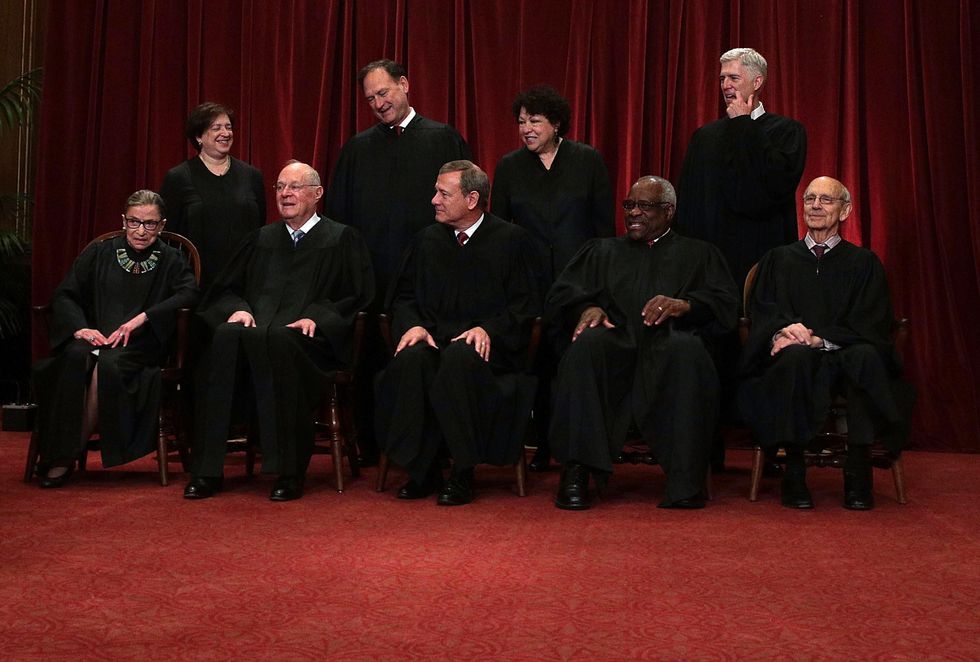
In a 7-2 ruling, the Supreme Court ruled today in favor of a Colorado baker who refused to bake a cake celebrating a same-sex wedding. (Photo by Alex Wong/Getty Images)

In a 7-2 decision, the Supreme Court has ruled that the Colorado Civil Rights Commission violated the First Amendment in its dealings with the Masterpiece Cakeshop in Colorado.
Justice Anthony Kennedy wrote the majority opinion for the court, which was joined by Justices Neil Gorsuch, Samuel Alito, John Roberts, Elena Kagan, and Stephen Breyer. Justice Clarence Thomas concurred in part with Kennedy's opinion and concurred with the result, making the final tally 7-2 in favor of overturning the 10th Circuit's decision, which had upheld the legality of the Civil Rights Commission's actions.
Justices Ruth Bader Ginsburg and Sonia Sotomayor cast the two dissenting votes.
The case concerned the plight of Jack Phillips, a Colorado baker who refused to bake a number of different kinds of cakes, based on his religious principles. For example, he refused to bake cakes that celebrated divorces, cakes that were infused with alcohol, cakes with obscene language or artwork, or cakes celebrating same-sex weddings.
Phillips and Masterpiece Cakeshop were sued by a gay couple under a Colorado state law (the Colorado Anti-Discrimination Act) that prohibits discrimination based on sexual orientation by any "place of business engaged in any sales to the public[.]"
Under CADA, the case was handled by the Colorado Civil Rights Division, which found that Masterpiece was in violation of the law and referred Masterpiece for a formal hearing in front of a state administrative law judge (ALJ). The Commission rejected Masterpiece's argument that compelling him to bake the cake would violate his rights under the First Amendment.
In ruling in favor of Masterpiece Cakeshop, the court declined to make sweeping rulings about the propriety of such laws as CADA generally, but instead focused on what it considered shortcomings in the Civil Rights Commission's deliberative processes.
Writing for the court, Justice Kennedy explained that "Colorado law can protect gay persons in acquiring products and services on the same terms and conditions as are offered to other members of the public, the law must be applied in a manner that is neutral toward religion."
The Court's opinion focused specifically on the open hositility toward religion that the Commission displayed:
Indeed, while the instant enforcement proceedings were pending, the State Civil Rights Division concluded in at least three cases that a baker acted lawfully in declining to create cakes with decorations that demeaned gay persons or gay marriages. Phillips too was entitled to a neutral and respectful consideration of his claims in all the circumstances of the case... That consideration was compromised, however, by the Commission’s treatment of Phillips’ case, which showed elements of a clear and impermissible hostility toward the sincere religious beliefs motivating his objection. As the record shows, some of the commissioners at the Commission’s formal, public hearings endorsed the view that religious beliefs cannot legitimately be carried into the public sphere or commercial domain, disparaged Phillips’ faith as despicable and characterized it as merely rhetorical, and compared his invocation of his sincerely held religious beliefs to defenses of slavery and the Holocaust. No commissioners objected to the comments. Nor were they mentioned in the later state-court ruling or disavowed in the briefs filed here. The comments thus cast doubt on the fairness and impartiality of the Commission’s adjudication of Phillips’ case.
As the court explained in its syllabus, it specifically left open the question of whether a state commission might have constitutionally found Phillips in violation of a state law if it were not so openly hostile to religion:
The inference here is thus that Phillips’ religious objection was not considered with the neutrality required by the Free Exercise Clause. The State’s interest could have been weighed against Phillips’ sincere religious objections in a way consistent with the requisite religious neutrality that must be strictly observed. But the official expressions of hostility to religion in some of the commissioners’ comments were inconsistent with that requirement, and the Commission’s disparate consideration of Phillips’ case compared to the cases of the other bakers suggests the same.
Thus, the larger question of whether bakers or other providers of services may categorically refuse to provide services for same-sex weddings was not resolved by the Court, and will likely need to be addressed in a future decision.